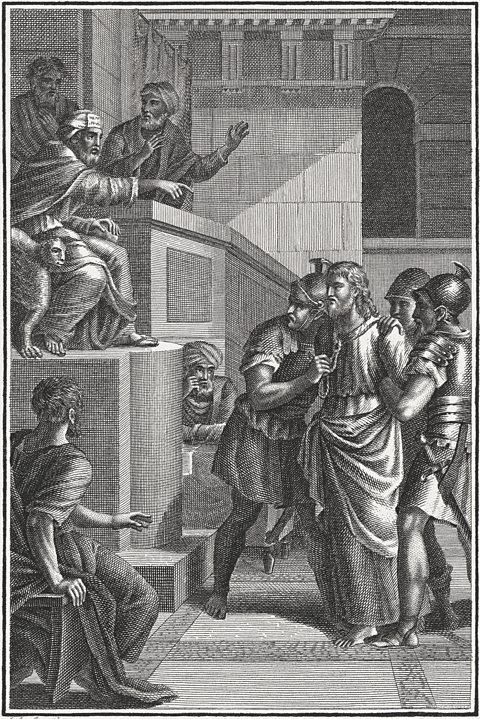Jesus’ trial before Pilate (Matthew 27:1-2, 11-26)
The chief priests and the elders made their plans against Jesus to put him to death. They put him in chains, led him off and handed him over to Pilate, the Roman governor.
Pilate asked Jesus “Are you the king of the Jews?” Jesus answered “So you say”, but he said nothing in response to the accusations of the chief priests and elders, which surprised Pilate.

At every PassoverJewish festival which remembers the escape of the ancient Israelites from Egypt. festival the Roman governor could set free a prisoner chosen by the crowd. Pilate asked the crowd whether they wanted Barabbas or Jesus set free. The chief priest persuaded the crowd to ask Pilate to set Barabbas free and have Jesus put to death. They shouted for Pilate to crucifyRoman method of execution by nailing someone to a cross, often until they die of asphyxiation; used on Jesus and many others. him. When Pilate saw that a riot might break out, he washed his hands in front of the crowd, and said, “I am not responsible for the death of this man!” The whole crowd answered, “Let the responsibility for his death fall on us and on our children!” Then Pilate set Barabbas free and handed Jesus over to be crucified.
Background
Now that the Jewish leaders have found Jesus guilty of a crime deserving the death sentence, they have to take him to the Roman Governor, Pontius Pilate. With Palestine an occupied country, only the Romans can put a person to death. This explains why Jesus has to have two trials.
The SanhedrinThe Jewish supreme court and legislative body during the Roman period. Also the name given to a section of the Talmud. has found Jesus guilty of the religious offence of blasphemySpeaking about God in a sacrilegious or disrespectful way. It can also mean claiming to have God-like powers.. This would be of no interest to the Romans, so the Jewish leaders have to change the charge against Jesus from claiming to be the Son of God to saying he is the King of the Jews. In doing so they are emphasising the political rather than religious implications of claiming to be the MessiahThe word means ‘the anointed one’. The Messiah is the one believed to be sent by God to be humanity’s saviour. Many Christians believe this person to be Jesus.. The Romans would take action for a political offence, particularly something that posed a threat to Roman rule.
Understanding the text
Pilate is in a difficult situation.
Throughout this trial, Jesus’ innocence is stressed:
- Pilate’s wife has had a dream telling her that Jesus is innocent and she sends a message to her husband about this.
- Pilate tries to avoid sentencing Jesus. It was a Passover custom for a prisoner, chosen by the people, to be released. Pilate attempts to use this custom by offering Jesus or Barabbas. Matthew describes Barabbas as a “notorious prisoner”, so he was probably a murderer.
- Pilate attempts to ask the crowd what crime Jesus has committed, but they shout “Crucify him!”
- Finally, Pilate publicly washes his hands to show that Jesus’ death is not his responsibility.
In protecting his position as governor, Pilate has a guilty man released and has Jesus flogged then handed over to be crucified.